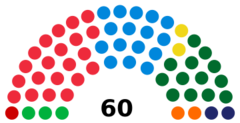User:Lyonsland/sandbox: Difference between revisions
No edit summary |
No edit summary |
||
| Line 1: | Line 1: | ||
== Government and politics == | |||
Hennehouwe is a {{wp|constitutional}} {{wp|federalism|federal}} {{wp|parliamentary republic}}. [[Stadtholder of Hennehouwe|Stadtholder]] [[Adriaan Wilhelm Paulus]] is the current head of state, whilst [[Premier of Hennehouwe|Premier]] [[Rupert van Bleiswijk]] serves as the head of the federal government. Hennehouwe's constitutional framework is laid out in the General Law (''Algemene Wet''), which has been in place since the formal creation of the Third Republic in 1936. Amendments to the General Law require a two-thirds {{wp|supermajority}} in both houses of the [[General Assembly (Hennehouwe)|General Assembly]], or via a {{wp|constitutional referendum}}. However, the fundamental principles of the constitution, as expressed in the articles guaranteeing human dignity, the separation of powers, the federal structure, republicanism and the rule of law are valid in perpetuity. | |||
{{multiple image | |||
|align=left | |||
|image1=Hearing_of_Commissioner-designate_Thierry_Breton_(49068069128)_(cropped).jpg | |||
|width1=165 | |||
|caption1=[[Stadtholder of Hennehouwe|Stadtholder]] [[Adriaan Wilhelm Paulus]] | |||
|alt1= | |||
|width2=155 | |||
|caption2=[[Premier of Hennehouwe|Premier]] [[Rupert van Bleiswijk]] | |||
|image2=Informal meeting of ministers responsible for development (FAC). Arrivals Alexander De Croo (36766610160) (cropped2).jpg | |||
|alt2= | |||
}} | |||
The [[Stadtholder of Hennehouwe|stadtholder]] is the head of state and invested primarily with representative responsibilities and powers. They are elected by the State Convention (''Staten Conventie''), an {{wp|electoral college}} consisting of members of the General Assembly and regional legislatures, divided in equal number by regions, who elected one of a candidate to the office. The stadtholder is based on the historical position that emerged during the First Republic when the position was more akin to an {{Wp|elected monarch}}. However, in a trend that started with the Second Republic and more codified under the Third Republic. the position has become ceremonial in nature akin to the position of president in other Euclean republics. The stadtholder nevertheless continues to appoint ministers, including the Premier, that have the confidence of the General Assembly to form the federal government. The current statdholder is [[Adriaan Wilhelm Paulus]] who has been in office since the 19 March 2012 and re-elected in 2018. Stadtholders under the Second Republic held the position for life but since the inception of the Third Republic serve a six-year term that is renewable once. Stadtholders are required to serve in office as an {{Wp|independent (politics)|independent}} but can previously have been a member of a political party. | |||
The [[Premier of Hennehouwe|Premier]] is the head of government and exercises executive power through their Cabinet. Premiers have to command the confidence of the General Assembly and often as such lead {{wp|coalition government|coalition governments}}. Premiers tend to be more a {{wp|first-among-equals}} in Hennehouwe compared to other Euclean heads of government with collective cabinet responsibility heavily emphasised. The current premier is [[Rupert van Bleiswijk]] who has been premier since the 14 June 2018. Van Bleiswijk leads a coalition of his own [[Socialist Labour Party (Hennehouwe)|Socialist Labour Party]] and the [[Progressive Democrats (Hennehouwe)|Progressive Democratic Party]], nicknamed the "{{Wp|purple government}}". | |||
{{Sidebar | |||
| name = Hennehouwe | |||
| outertitle = [[Senate (Hennehouwe)|Senate]] | |||
| topimage = | |||
| pretitle = | |||
| title = | |||
| image = [[File:Senate_of_Belgium_hemicycle.jpg|200px]] | |||
| headingstyle = | |||
| contentstyle = | |||
| heading1 = | |||
| content1 = | |||
[[Image:Hennish senate 2017.png|240px|right]]<br>'''Government (37)'''<br>{{colorbox|#EE2A3B}} [[Socialist Labour Party (Hennehouwe)|Socialist Labour Party]] (21)<br>{{colorbox|#0087DC}} [[Progressive Democrats (Hennehouwe)|Progressive Democratic Party]] (16)<br>'''Confidence and supply (2)'''<br>{{colorbox|#F0D719}} [[Party for the Petois]] (2)<br>'''Opposition (21)'''<br>{{colorbox|#006B2D}} [[National People's Party (Hennehouwe)|National People's Party]] (13)<br>{{colorbox|#00b13d}} [[Green Party (Hennehouwe)|Green Party]] (3)<br>{{colorbox|#21276a}} [[Patriot's March]] (2)<br>{{colorbox|#FF6A00}} [[People's Party for Sotirian Democracy]] (2)<br>{{colorbox|#cc0000}} [[The Left (Hennehouwe)|The Left]] (1) | |||
}} | |||
{{Sidebar | {{Sidebar | ||
| name = Hennehouwe | | name = Hennehouwe | ||
| outertitle = [[ | | outertitle = [[Chamber of Deputies (Hennehouwe)|Chamber of Deputies]] | ||
| topimage = | | topimage = | ||
| pretitle = | | pretitle = | ||
| Line 12: | Line 41: | ||
[[Image:Hennish_Chamber_2017.png|240px|right]]<br>'''Government (89)'''<br>{{colorbox|#EE2A3B}} [[Socialist Labour Party (Hennehouwe)|Socialist Labour Party]] (49)<br>{{colorbox|#0087DC}} [[Progressive Democrats (Hennehouwe)|Progressive Democratic Party]] (40)<br>'''Confidence and supply (11)'''<br>{{colorbox|#F0D719}} [[Party for the Petois]] (6)<br>{{colorbox|#8ec83e}} [[Agrarian–Farmer's Party]] (5)<br>'''Opposition (80)'''<br>{{colorbox|#006B2D}} [[National People's Party (Hennehouwe)|National People's Party]] (36)<br>{{colorbox|#21276a}} [[Patriot's March]] (16)<br>{{colorbox|#00b13d}} [[Green Party (Hennehouwe)|Green Party]] (11)<br>{{colorbox|#cc0000}} [[The Left (Hennehouwe)|The Left]] (7)<br>{{colorbox|#FF6A00}} [[People's Party for Sotirian Democracy]] (6)<br>{{colorbox|#000000}} [[LIVE – The Liberal Union]] (4) | [[Image:Hennish_Chamber_2017.png|240px|right]]<br>'''Government (89)'''<br>{{colorbox|#EE2A3B}} [[Socialist Labour Party (Hennehouwe)|Socialist Labour Party]] (49)<br>{{colorbox|#0087DC}} [[Progressive Democrats (Hennehouwe)|Progressive Democratic Party]] (40)<br>'''Confidence and supply (11)'''<br>{{colorbox|#F0D719}} [[Party for the Petois]] (6)<br>{{colorbox|#8ec83e}} [[Agrarian–Farmer's Party]] (5)<br>'''Opposition (80)'''<br>{{colorbox|#006B2D}} [[National People's Party (Hennehouwe)|National People's Party]] (36)<br>{{colorbox|#21276a}} [[Patriot's March]] (16)<br>{{colorbox|#00b13d}} [[Green Party (Hennehouwe)|Green Party]] (11)<br>{{colorbox|#cc0000}} [[The Left (Hennehouwe)|The Left]] (7)<br>{{colorbox|#FF6A00}} [[People's Party for Sotirian Democracy]] (6)<br>{{colorbox|#000000}} [[LIVE – The Liberal Union]] (4) | ||
}} | }} | ||
Federal legislative power is vested in the {{wp|bicameralism|bicameral}} [[General Assembly (Hennehouwe)|General Assembly]]. It consists of the more executively powerful {{wp|lower house}}, the [[Chamber of Deputies (Hennehouwe|Chamber of Deputies]], and the {{wp|upper house}}, the [[Senate (Hennehouwe)|Senate]]. The 180 seats of the Chamber of Deputies are directly elected via {{wp|open-list proportional representation}} using the ten regions as constituencies. There is no {{wp|electoral threshold}}, meaning the effective barrier varies depending on the size of the region (the largest region, Flamia, returns 40 members to the Chamber, whilst Oudkessel-Witburg, the smallest, returns seven). The 60 members of the Senate are indirectly elected by members of the States Convention on a region-by-region basis (with the exception of incumbent senators) via {{wp|single non-transferable vote}}. Elections for the Chamber take place every four years, but may be dissolved earlier with a two-thirds supermajority in the Chamber. Elections for the Senate take place exactly twelve weeks after elections to the lower house. | |||
===Political culture=== | |||
Hennehouwe's political culture is noted both for its consensus based approach as well social tolerance, being one of the most historically progressive states in [[Euclea]] adopting female suffrage, proportional representation, divorce, abortion and prostitution liberalisation, LGBT+ rights and a non-punitive drug policy earlier then other Euclean nations. However recently issues such as {{wp|multiculturalism}} and {{Wp|Eurospecticism|eucloskepticism}} have challenged this social tolerance and led to more divisive attitudes in the Hennish population. | |||
Revision as of 02:13, 10 April 2021
Government and politics
Hennehouwe is a constitutional federal parliamentary republic. Stadtholder Adriaan Wilhelm Paulus is the current head of state, whilst Premier Rupert van Bleiswijk serves as the head of the federal government. Hennehouwe's constitutional framework is laid out in the General Law (Algemene Wet), which has been in place since the formal creation of the Third Republic in 1936. Amendments to the General Law require a two-thirds supermajority in both houses of the General Assembly, or via a constitutional referendum. However, the fundamental principles of the constitution, as expressed in the articles guaranteeing human dignity, the separation of powers, the federal structure, republicanism and the rule of law are valid in perpetuity.
The stadtholder is the head of state and invested primarily with representative responsibilities and powers. They are elected by the State Convention (Staten Conventie), an electoral college consisting of members of the General Assembly and regional legislatures, divided in equal number by regions, who elected one of a candidate to the office. The stadtholder is based on the historical position that emerged during the First Republic when the position was more akin to an elected monarch. However, in a trend that started with the Second Republic and more codified under the Third Republic. the position has become ceremonial in nature akin to the position of president in other Euclean republics. The stadtholder nevertheless continues to appoint ministers, including the Premier, that have the confidence of the General Assembly to form the federal government. The current statdholder is Adriaan Wilhelm Paulus who has been in office since the 19 March 2012 and re-elected in 2018. Stadtholders under the Second Republic held the position for life but since the inception of the Third Republic serve a six-year term that is renewable once. Stadtholders are required to serve in office as an independent but can previously have been a member of a political party.
The Premier is the head of government and exercises executive power through their Cabinet. Premiers have to command the confidence of the General Assembly and often as such lead coalition governments. Premiers tend to be more a first-among-equals in Hennehouwe compared to other Euclean heads of government with collective cabinet responsibility heavily emphasised. The current premier is Rupert van Bleiswijk who has been premier since the 14 June 2018. Van Bleiswijk leads a coalition of his own Socialist Labour Party and the Progressive Democratic Party, nicknamed the "purple government".
 |
|
Government (37) Socialist Labour Party (21) Progressive Democratic Party (16) Confidence and supply (2) Party for the Petois (2) Opposition (21) National People's Party (13) Green Party (3) Patriot's March (2) People's Party for Sotirian Democracy (2) The Left (1) |
 |
|
Government (89) Socialist Labour Party (49) Progressive Democratic Party (40) Confidence and supply (11) Party for the Petois (6) Agrarian–Farmer's Party (5) Opposition (80) National People's Party (36) Patriot's March (16) Green Party (11) The Left (7) People's Party for Sotirian Democracy (6) LIVE – The Liberal Union (4) |
Federal legislative power is vested in the bicameral General Assembly. It consists of the more executively powerful lower house, the Chamber of Deputies, and the upper house, the Senate. The 180 seats of the Chamber of Deputies are directly elected via open-list proportional representation using the ten regions as constituencies. There is no electoral threshold, meaning the effective barrier varies depending on the size of the region (the largest region, Flamia, returns 40 members to the Chamber, whilst Oudkessel-Witburg, the smallest, returns seven). The 60 members of the Senate are indirectly elected by members of the States Convention on a region-by-region basis (with the exception of incumbent senators) via single non-transferable vote. Elections for the Chamber take place every four years, but may be dissolved earlier with a two-thirds supermajority in the Chamber. Elections for the Senate take place exactly twelve weeks after elections to the lower house.
Political culture
Hennehouwe's political culture is noted both for its consensus based approach as well social tolerance, being one of the most historically progressive states in Euclea adopting female suffrage, proportional representation, divorce, abortion and prostitution liberalisation, LGBT+ rights and a non-punitive drug policy earlier then other Euclean nations. However recently issues such as multiculturalism and eucloskepticism have challenged this social tolerance and led to more divisive attitudes in the Hennish population.



